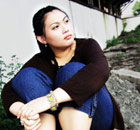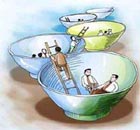Society
Here, interviews are like old friends catching up
By Zhang Jin (China Daily)
Updated: 2010-04-24 06:47
 |
Large Medium Small |
YUSHU, Qinghai - If you think people living in this remote agricultural region are media-shy, think again.

Ever since I landed in the northwestern province following the April 14 earthquake, I have traveled through several makeshift settlements and met numerous survivors.
Seeing a stranger holding a camera walk toward them, they always initiate the conversation.
"You must be a reporter." That's how an hour-long conversation here usually begins.
The conversations are more like chats that occur between old friends, instead of interviews.
And the people here never try to dodge questions. They'll tell you exactly what they're thinking, whether you like it or not.
For a journalist who wants to get the real picture of the quake-ravaged region, it's a boon.
Our chats include thoughts about life, religion, the Himalayan marmots and the sky. That is after they've spoken too much about the quake, which has up until now gobbled up 2,187 lives.
And as the conversations continue, I don't even realize when I become the interviewee.
At the Horse Racing Ground, where tens of hundreds of survivors have found shelter, a woman asks me whether an earthquake would hit her hometown again.
"Probably not," I say.
"Then why are there so many aftershocks? Didn't you feel them?"
During the early hours of Tuesday and Wednesday, I was jolted up by two obvious aftershocks.
"Yes, I did feel them."
"You know, many say the quake was a punishment handed down by the 'god of the mountain' because people explored the mountains for silver ores," she says.
I quickly recollected all the knowledge of earthquakes my geography teacher had passed on to me in my teens, and then squatted down to sketch a world map on the ground with a small rock.
I must thank Alfred Wegener, a renowned German geophysicist, whose years-old theory of continental drift left the woman a little less worried.
Several days ago, before radios, TV and mobile phones became available for most survivors, news reporters were one of their major sources of information.
Another Tibetan woman at Yushu Stadium, another makeshift settlement, asked me how many corpses were cremated on April 17.
"About 1,000," I told her.
Wearing a grim face, she said she felt sorry for those unidentified bodies.
Then I told her that samples of these bodies have been preserved. They could be identified later.
This time, I tried not to use words like DNA or genes, which she obviously won't understand.
The woman interrupted my silly lecture and asked: "You mean the scientists can identify the bodies, right?"
"Yes," I said, and saw her eyes light up immediately.
During my stay in Yushu, I slept four hours a day, wore out a pair of shoes traveling on my feet for hours.
But I'm still not down or out. The people here have cheered me up.
(China Daily 04/24/2010 page4)







